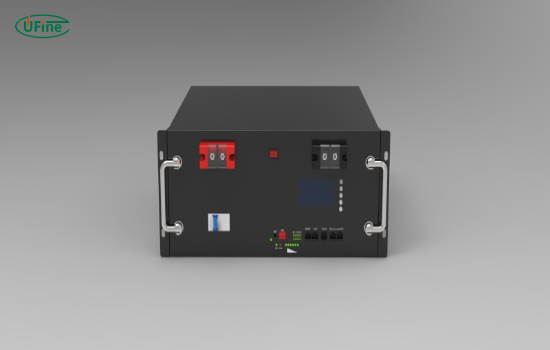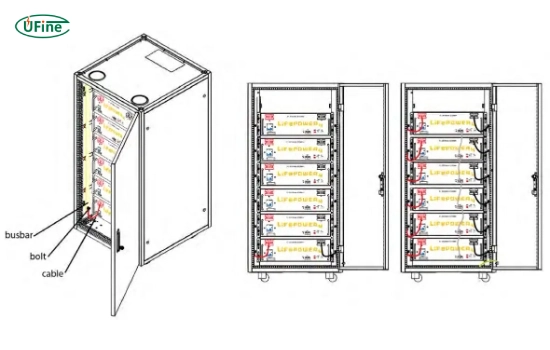
- Part 1. What is a server rack battery?
- Part 2. What does a server rack battery do?
- Part 3. What are server rack batteries made of?
- Part 4. Where are server rack batteries used?
- Part 5. Why choose 48V LiFePO4 server rack batteries?
- Part 6. How does a server rack battery system work?
- Part 7. What are the advantages of server rack batteries?
- Part 8. How to install a server rack battery?
- Part 9. How to take care of a server rack battery?
- Part 10. What mistakes should you avoid?
- Part 11. FAQs about server rack battery
- Part 12. Looking for a reliable server rack battery solution?
What is a server rack battery? A server rack battery is a backup power solution used in data centers and IT rooms. It protects your servers and network equipment from losing power when the main electricity source fails.
These batteries are designed to fit directly into standard server racks. They are safe, efficient, and essential for keeping systems running without interruption. In this guide, we’ll explain what server rack batteries are, how they work, what they’re made of, and where they are used. If you’re looking for a reliable backup power option, this is the guide for you.
Part 1. What is a server rack battery?
A server rack battery is a rechargeable battery unit placed inside a server rack. Its main job is to supply power to IT equipment when the main electricity goes out. This prevents servers from shutting down suddenly, which could lead to data loss or system crashes.
These batteries are often used together with a UPS (Uninterruptible Power Supply). When the power fails, the UPS switches to battery power instantly. This gives your systems time to stay online or shut down safely.
Part 2. What does a server rack battery do?
Simply put, a server rack battery keeps your IT systems alive when the power goes out. It acts like a safety net. If the power supply is interrupted, the battery kicks in automatically to keep everything running for a short time.
This short window of backup power allows:
- Servers to keep working until power is restored
- IT teams to shut down systems properly
- Switching to generators if needed
Without a server rack battery, even a small power cut can cause big problems like lost files, broken equipment, or downtime.
Part 3. What are server rack batteries made of?
Server rack batteries are made up of several important parts that work together to store and deliver power safely.
1. Battery Cells
These are the core of the battery. Many server rack batteries use LiFePO4 (Lithium Iron Phosphate) cells. This type of battery is safer, lasts longer, and is more stable than older battery types like lead-acid.
2. BMS (Battery Management System)
The BMS is like the brain of the battery. It watches over the battery’s health, checks the temperature, prevents overcharging, and balances the charge between cells. Without a BMS, the battery could become unsafe.
3. 48V System
Most server rack batteries are built as 48V systems. This voltage is perfect for IT equipment because it strikes a good balance between power output and safety. A 48V battery system can power servers, switches, routers, and even small data centers.
Part 4. Where are server rack batteries used?
Server rack batteries are used in many places where reliable power is a must. Common application scenarios include:
- Data Centers: Large server farms rely on rack batteries for backup.
- Server Rooms: Small or medium-sized businesses use them to protect critical IT systems.
- Telecom Stations: Keep communication networks online.
- Edge Computing: Power equipment in remote or off-grid locations.
- Industrial Automation: Maintain power for machines and control systems.
Wherever uptime matters, server rack batteries provide a fast and reliable backup.
Part 5. Why choose 48V LiFePO4 server rack batteries?
The 48V LiFePO4 server rack battery is one of the best power backup solutions available today. Here’s why:
- Safe and Stable: LiFePO4 batteries are not likely to overheat or catch fire.
- Longer Life: These batteries can last over 10 years with proper care.
- Compact Size: Fits easily into standard 19-inch server racks.
- High Efficiency: Better energy use and faster charging.
- Low Maintenance: No need for frequent checks or water refills.
- Environment-Friendly: No toxic chemicals or leaking acid.
For IT teams looking for a smart, long-term investment, 48V LiFePO4 batteries are the top choice.
Part 6. How does a server rack battery system work?
Here’s a simple step-by-step of how the system works:
- Normal Conditions: Power comes from the grid. The battery stays charged.
- Power Failure: The UPS detects a problem and switches to battery power.
- Battery Discharge: The battery powers the IT equipment immediately.
- Power Recovery: When grid power returns, the battery recharges.
- Ready Again: The system is ready for the next outage.
This automatic switch happens in milliseconds, so your systems stay on without any delay.
Part 7. What are the advantages of server rack batteries?
Server rack batteries provide many benefits:
- Zero Downtime: Keeps systems online during outages
- Protection for Data: Prevents data loss caused by sudden shutdowns
- Flexible Design: Easy to add more battery packs as your system grows
- Clean Power: Protects devices from power surges or voltage drops
- Remote Monitoring: Check battery status from your computer or phone
These features make server rack batteries a must-have in any modern IT setup.
Part 8. How to install a server rack battery?
Installing a server rack battery is easier than you might think, especially with a plug-and-play system.
Here’s how it usually goes:
- Plan Space: Choose where the battery will go in your rack.
- Mount Battery: Slide it into the rack and secure it with screws.
- Connect Cables: Link the battery to your UPS system.
- Power On: Turn everything on and check for normal operation.
- Test Backup: Simulate a power cut to make sure it works.
Always follow the safety instructions from the manufacturer.
Part 9. How to take care of a server rack battery?
Proper care helps your battery last longer and work better. Here are tips:
- Keep it Cool: Ideal temperature is around 20–25°C.
- Clean Connections: Dust and loose cables can cause problems.
- Use Monitoring Tools: Many batteries offer software to track health and performance.
- Avoid Deep Discharges: Try not to drain the battery completely.
- Check Alerts: Pay attention to warning lights or emails.
With these simple steps, your battery can last many years.
Part 10. What mistakes should you avoid?
Here are common mistakes to watch out for:
- Choosing the Wrong Voltage: Always match your system’s needs.
- Overloading the Battery: Know how much power your equipment uses.
- Ignoring Maintenance: Even low-maintenance batteries need basic care.
- Poor Ventilation: Batteries need airflow to stay cool.
- Mixing Battery Types: Stick with the same type and brand when expanding.
Avoid these issues to keep your system safe and efficient.
Part 11. FAQs about server rack battery
What is a server rack battery used for?
A server rack battery is used to provide backup power for IT equipment like servers, switches, and routers when the main power goes out.
What is the difference between LiFePO4 and lead-acid batteries?
LiFePO4 batteries last longer, charge faster, and are safer than lead-acid batteries. They’re also lighter and require less maintenance.
How long can a server rack battery last during an outage?
It depends on the battery size and your equipment load. Most can provide power for 5 to 30 minutes, or even longer with larger setups.
Can I expand my server rack battery system later?
Yes. Many systems are modular, so you can add more battery units as your power needs grow.
Is a 48V system safe for server rooms?
Yes. 48V systems are safe, efficient, and widely used in IT environments. They offer a good mix of power and safety.
Part 12. Looking for a reliable server rack battery solution?
If you’re planning to upgrade your data center or server room, Ufine offers high-quality 48V LiFePO4 server rack battery solutions. These batteries come with built-in BMS, high energy efficiency, and smart monitoring options. Whether you need backup power for a small office or a large data center, Ufine has the right product for you.
Discover Ufine’s 48V server rack batteries and take the first step toward safer, smarter, and more efficient power backup for your IT systems.
Related Tags:
More Articles

What are Watts and Watt Hours in Battery?
Understand watt vs watt-hour in batteries, how to calculate battery watt hours, and what Wh means for car batteries, devices, and energy storage.
A Complete Guide to the Best Batteries for Flashlights
Compare the best batteries for flashlights, including AA, AAA, 18650, 21700, CR123A. See which battery offers the best brightness, runtime, and reliability.
How Long Do Rechargeable AA Batteries Last?
How long do rechargeable AA batteries last? Compare NiMH and lithium AA lifespan, recharge cycles, key factors, and performance vs alkaline batteries.
How Much Current Can a 9V Battery Really Supply?
Discover how many amps a 9V battery can supply, its actual current output, discharge rate, and capacity for alkaline, lithium, and rechargeable 9V batteries.
12V STD vs 12V AGM: Meaning, Differences, and Which Is Better
Understand what STD and AGM batteries mean, their key differences, and which 12V battery fits your needs best in 2026.




